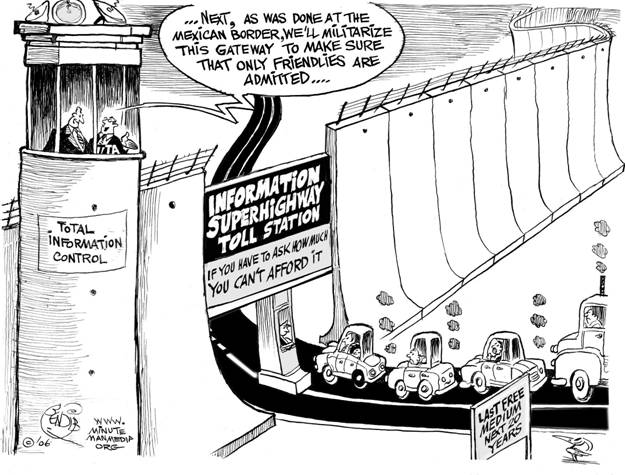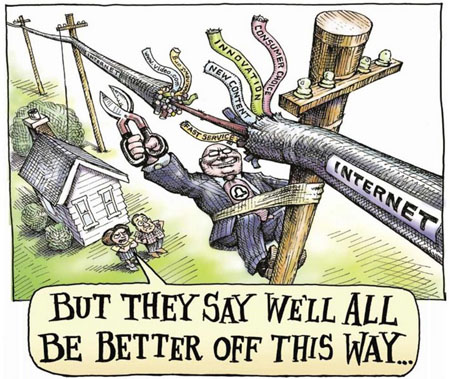User Tools
Sidebar
Table of Contents
Network Neutrality
Network neutrality (or “net neutrality”) is the idea that "a maximally useful public information network aspires to treat all content, sites, and platforms equally." Proponents of net neutrality believe that internet service providers, in addition to governments, should place no restrictions on how their clients use the internet. In the United States, net neutrality is a political hot topic and numerous attempts have been made to pass bills allowing the government to enforce network neutrality.
The debate over net neutrality dates back to much earlier debates over who should regulate telephone or even telegraph communications, but the recent massive growth in internet usage and data transmitted over the internet has called into question whose right it is to regulate it. Proponents of net neutrality state that it is a person's right as to what they use the internet for and that corporations should not intervene. Opponents state that it is important to regulate bandwidth usage and that the corporations have the right to oversee their clients usage of the internet. It is also called into question whether or not the government can regulate the actions of internet service providers in order to enforce net neutrality.
History
2004: FCC Chairman Michael Powell gives a speech explaining four “Internet Freedoms:” freedom of expression, freedom of end-user control, freedom of competition, and freedom to innovate without permission. Powell promotes net neutrality in this speech.
2005: Madison River, a telephone company, blocks Vonage services in one of the first cases of an ISP discriminating against their traffic. The FCC stops this, stating that people are entitled to the lawful internet content of their choice.
2006: Congress attempts to pass the first network neutrality bill. Many prominent internet figures rise in support of the bill but it fails to pass. Additional bills are introduced in 2007 and 2008.
2007: Comcast is accused of blocking peer to peer files on its network in order to reduce competition with its pay TV service, the FCC launches an investigation.
2008: The FCC finds Comcast guilty of blocking peer to peer files, they are condemned and ordered to implement a new network managing plan which does not allow for such behavior.
2009: Comcast files a lawsuit against the FCC and the FCC ceases creating specific rules to enforce net neutrality.
2010: The court judges that the FCC lacks the authority to force new rules on Comcast.
The Cases For and Against Network Neutrality
- Prevents ISP's or the Government from controlling or filtering internet content without a court order.
- Keeps the internet open, maintains a maximally useful public information network aspires to treat all content, sites, and platforms equally.
- Prevents corporations from overriding the standards that the internet already operates on.
- Supports the “end-to-end principle,” assures that "all like Internet content must be treated alike and move at the same speed over the network."
- Works against innovation and competition
- Some believe that the government is incapable of making good choices regarding the internet and is not in a position to tell companies how to run their networks.
- No regulation is needed, the idea is "overhyped and misleading."



